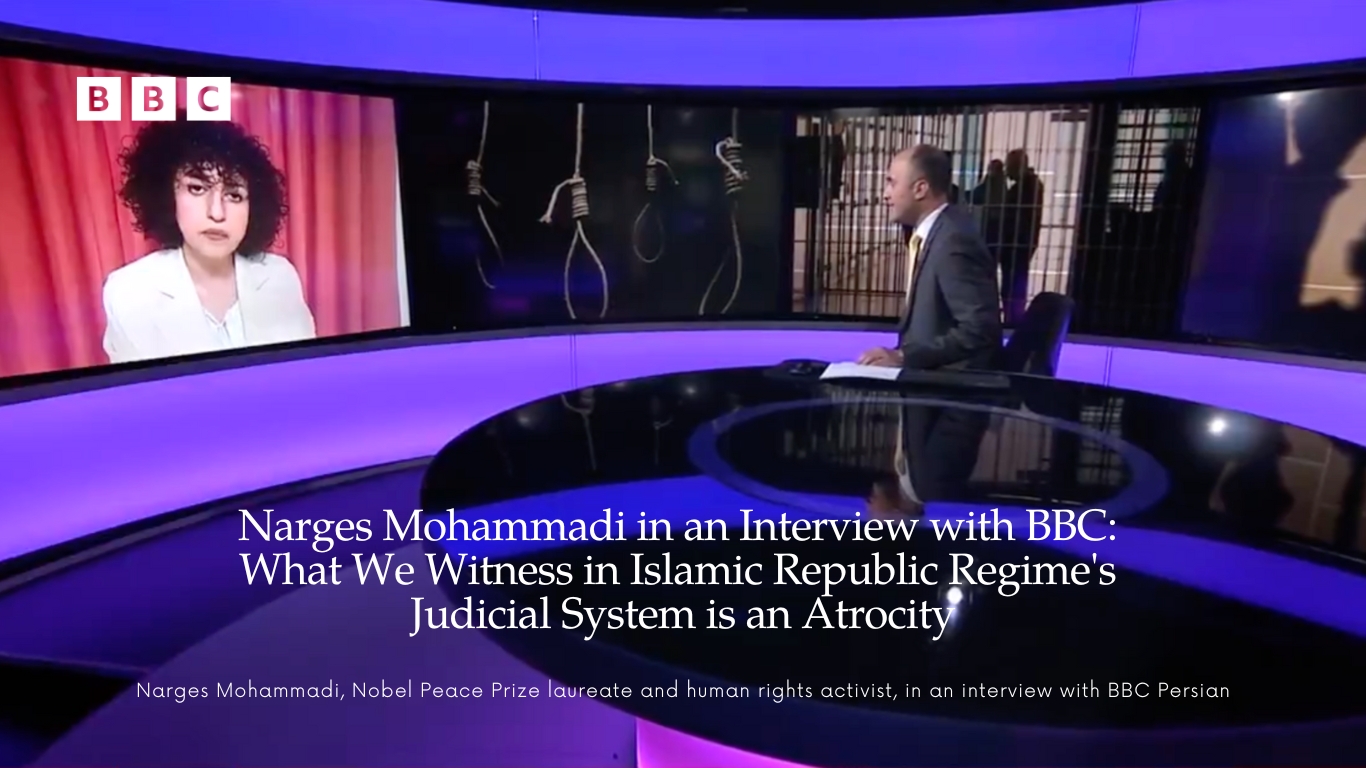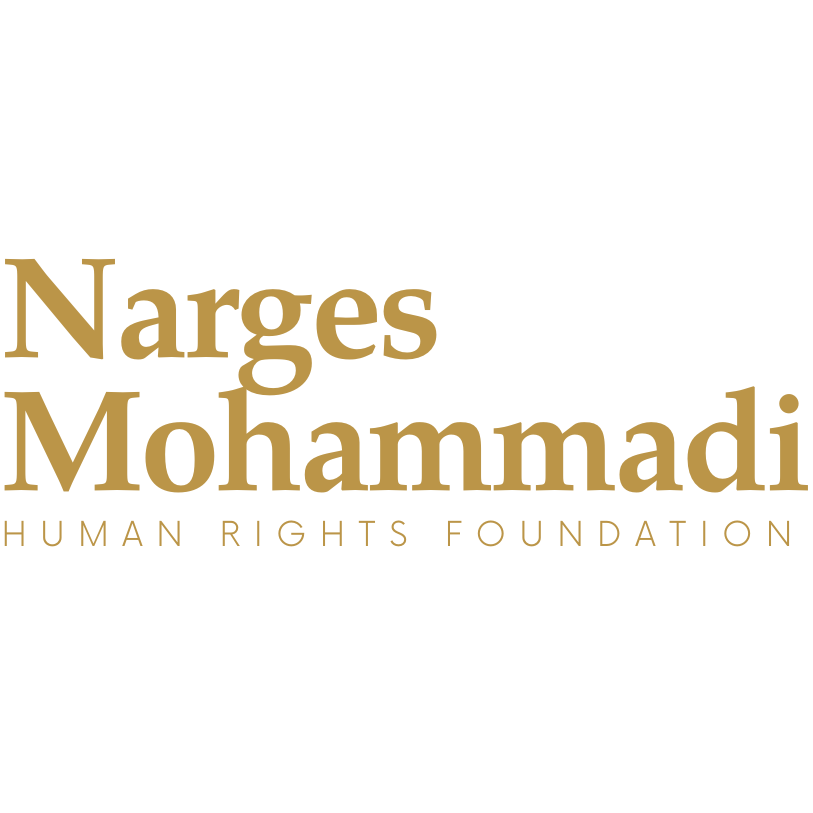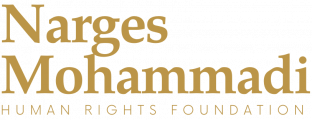
Narges Mohammadi in an Interview with BBC: What We Witness in Islamic Republic Regime’s Judicial System is an Atrocity
Narges Mohammadi in an Interview with BBC: What We Witness in Islamic Republic Regime’s Judicial System is an Atrocity
May 28, 2025
On the morning of Wednesday, May 28, 2025, Mizan News Agency—the official outlet of the Islamic Republic’s Judiciary—announced the execution of Pedram Madani, a 41-year-old man convicted of spying for Israel. His hanging took place in Ghezelhesar Prison in Karaj, just outside Tehran, following his transfer earlier this week from Evin Prison, where he had been held since his arrest in 2019. The execution was carried out despite urgent appeals from his family and human rights activists, who condemned the sentence as the outcome of a deeply flawed and unjust trial.
Narges Mohammadi, Nobel Peace Prize laureate and human rights activist, in an interview with BBC Persian, emphasized the widespread violations of defendants’ rights in the Islamic Republic’s judicial process. She said:
“The reality is that for many of these defendants, we cannot speak of a right to choose. Choice has a specific meaning—but when someone is kept in solitary confinement and doesn’t even have the right to open the door to use the bathroom, that word becomes meaningless.” Referring to the judicial process, she added:
“Can you really talk about the right to choose a lawyer, when the accused is deprived of fresh air, phone calls, and visits? In such conditions, the interrogator dominates not only the case but every aspect of the individual’s life and mental state.”
Mohammadi, drawing on documented experiences from the White Torture research project on solitary confinement, explained:
“In many cases, detainees give up their right to a lawyer on the interrogator’s recommendation, hoping it might ease the pressure or get them out of solitary. In those situations, escaping the torture becomes the priority—not choosing legal representation.”
She also stressed:
“In many cases, the lawyers introduced are not only not chosen by the defendant, but actually cooperate directly with the judicial system. Some detainees have said they didn’t even exchange two words with these lawyers. The lawyer would walk into court, speak with the judge, and leave—without a single word to their client.”
Speaking bluntly, Narges Mohammadi stated:
“What we are witnessing in the judicial system of the Islamic Republic is an atrocity. They place a person in conditions where even the most basic human rights are stripped away. A pre-written project is imposed on them—and their role in that script is already determined.”
She continued:
“In such a system, there is no place for due process, for justice, or for the right to legal counsel. This system is beyond reform—and shows no sign of change.”
In response to a question about the prospects for change, Mohammadi said:
“I believe change will not come from within the Judiciary. It must rise from the will of the people, of civil and human rights activists. We must move toward national and global coalitions to fight the death penalty.”
She warned about the accelerating trend of executions:
“Execution in Iran has become a tool of repression. Both the frequency of executions has increased, and the government’s goal is clear: to instill fear, to push people back, and to silence protest.”
In conclusion, Narges Mohammadi emphasized the need for meaningful global action:
“Issuing statements is not enough. International bodies must use every mechanism and capacity available to pressure the Iranian government. My hope lies with Iran’s civil society, with the media, and with those who fight for human rights. The media must also take this seriously and dedicate the necessary time and attention to it.”“We say no to execution—regardless of the law, regardless of the crime,” she stated. “But what we are witnessing in Iran is worse than capital punishment under flawed laws. These are executions without due process, based on confessions extracted under pressure, in solitary confinement, without evidence, and without fair trials.”
Mohammadi explained how the Iranian judiciary regularly ignores even its own legal framework. In cases like Mohammad Ghobadi and others, confessions obtained under duress become the sole basis for death sentences. Neither the investigation nor the court process meets minimum legal standards. Legal objections and requests for retrials are routinely dismissed.
“This is not just about political prisoners,” she emphasized. “Even in Zanjan and Qarchak prisons, we saw non-political prisoners executed after being coerced into false confessions. The courts don’t care about proof. They care about closing cases.”
نرگس محمدی در گفتگو با بیبیسی : آنچه در سیستم قضایی ایران شاهد هستیم جنایت است.
۷ خرداد ۱۴۰۴
خبرگزاری قوه قضاییه جمهوری اسلامی، میزان، صبح چهارشنبه هفتم خرداد ۱۴۰۴ اعلام کرد که پدرام مدنی اعدام شد.
نرگس محمدی، برنده جایزه نوبل صلح و فعال حقوق بشر، در گفتگو با بیبیسی فارسی، با تأکید بر نقض گسترده حقوق متهمان در روند دادرسی جمهوری اسلامی، چنین گفت:
«واقعیت این است که در مورد بسیاری از این متهمان، نمیتوان از حق انتخاب سخن گفت. انتخاب معنای مشخصی دارد، اما وقتی متهم را در سلول انفرادی قرار میدهند و حتی اجازه باز کردن در برای رفتن به سرویس بهداشتی را ندارد، انتخاب بیمعنا میشود.»
او با اشاره به روند دادرسی افزود:
«آیا واقعاً میتوان از حق انتخاب وکیل صحبت کرد، وقتی متهم حتی از هواخوری، تماس تلفنی و ملاقات محروم میشود؟ در چنین شرایطی، بازجو نه تنها بر پرونده، بلکه بر زندگی روزمره و روان فرد نیز تسلط کامل دارد.»
نرگس محمدی، با اشاره به تجربههای مستند از پروژه تحقیقاتی شکنجه سفید و زندان انفرادی، گفت:
«در پروندههای متعددی، متهمان به توصیه بازجو از حق داشتن وکیل صرفنظر میکنند، به این امید که شاید فشارها کمتر شود، یا از انفرادی خارج شوند. در چنین شرایطی، رهایی از شکنجه اولویت پیدا میکند، نه انتخاب وکیل.»
او همچنین تأکید کرد:
«در بسیاری از موارد، وکلای معرفیشده نه تنها انتخاب متهم نیستند، بلکه همکاری مستقیم با دستگاه قضایی دارند. برخی متهمان حتی میگفتند که دو کلمه هم با این وکلا صحبت نکردهاند. وکیل مستقیماً با قاضی صحبت میکرد، بدون کوچکترین ارتباط با موکل خود.»
نرگس محمدی صریح و بیپرده گفت:
«آنچه در سیستم قضایی جمهوری اسلامی شاهد هستیم، جنایت است. انسان را در موقعیتی قرار میدهند که از ابتداییترین حقوق انسانی محروم میشود. پروژهای از پیش طراحیشده برایش تعریف میکنند، و جای او در آن پروژه را نیز تعیین کردهاند.»
او ادامه داد:
«در چنین نظامی، دیگر جایی برای دادرسی عادلانه، برای عدالت، یا برای حق برخورداری از وکیل وجود ندارد. این سیستم، نه اصلاحپذیر است و نه نشانهای از تحول در آن دیده میشود.»
در پاسخ به پرسشی درباره چشمانداز تغییر، محمدی گفت:
«من معتقدم این تغییر نه از درون قوه قضاییه، بلکه از اراده مردم و فعالان حقوق بشر، مدنی و اجتماعی برمیخیزد. باید به سمت ائتلافهای ملی و جهانی برای مقابله با مجازات اعدام حرکت کرد.»
او نسبت به روند فزاینده اعدامها هشدار داد:
«اعدام در ایران به ابزاری برای سرکوب جامعه تبدیل شده. هم شدت اجرای آن بیشتر شده، و هم هدف حکومت روشن است: ایجاد ترس، عقبنشاندن مردم، و خاموش کردن اعتراضها.»
در پایان، نرگس محمدی بر لزوم اقدام مؤثر جهانی تأکید کرد:
«صدور بیانیه کافی نیست. مجامع بینالمللی باید از همه ظرفیتهای موجود برای فشار بر حکومت ایران استفاده کنند. من امیدم به جامعه مدنی ایران است، به رسانهها و به کسانی که برای حقوق بشر میجنگند. رسانهها هم باید این مسئله را جدی بگیرند و به آن زمان و توجه کافی اختصاص دهند


